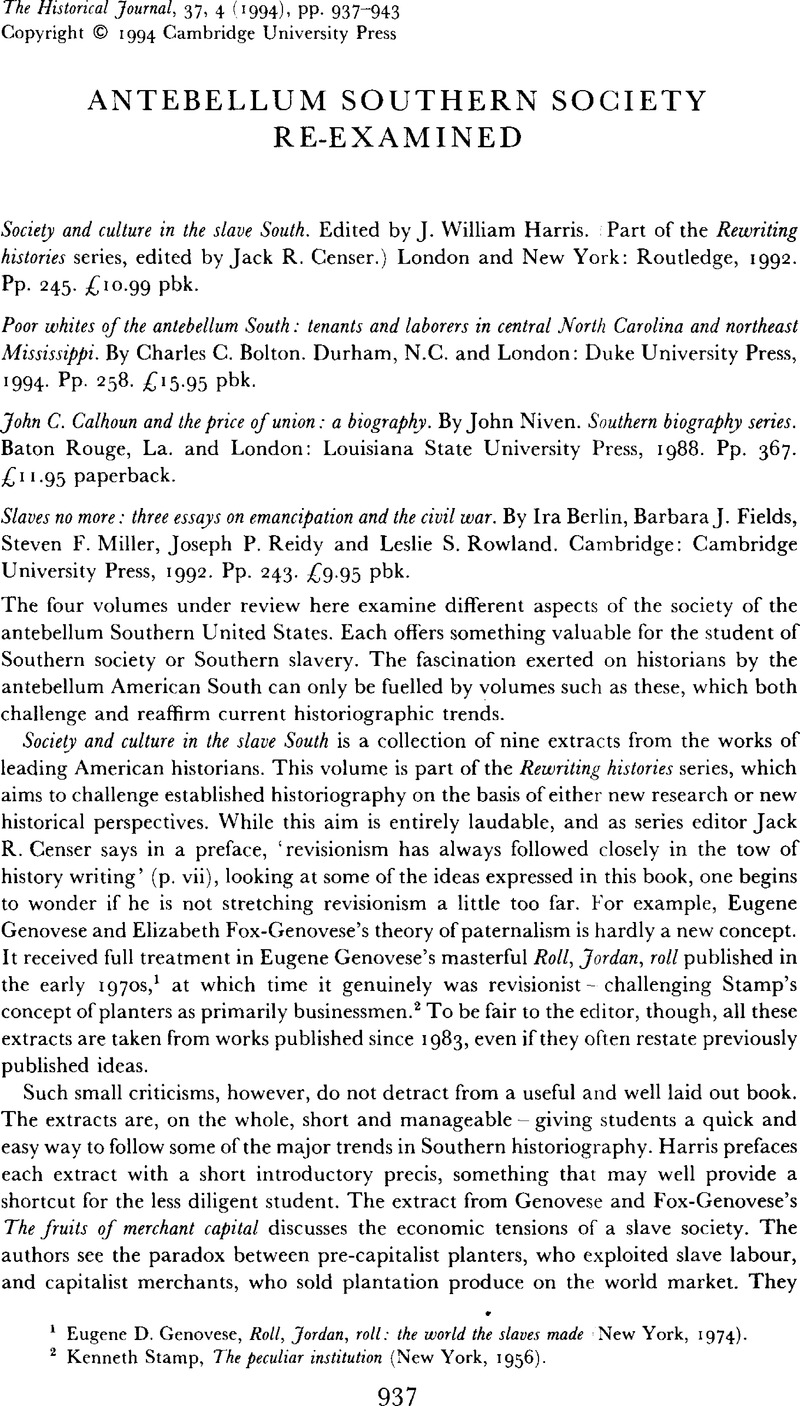No CrossRef data available.
Article contents
Antebellum Southern society re-examined
Published online by Cambridge University Press: 11 February 2009
Abstract

- Type
- Review Articles
- Information
- Copyright
- Copyright © Cambridge University Press 1994
References
1 Genovese, Eugene D., Roll, Jordan, roll: the world the slaves made (New York, 1974).Google Scholar
2 Stamp, Kenneth, The peculiar institution (New York, 1956).Google Scholar
3 See for example, Gutman, Herbert G., The black family in slavery and freedom (Oxford, 1976)Google Scholar; and Levine, Lawrence W., Black culture and consciousness: Afro-American thought from slavery to freedom (Oxford, 1977).Google Scholar
4 See for example McCurry, Stephanie, ‘Defense of their world: gender, class and the yeomanry of the South Carolina lowcounty, 1820–1860’ (unpublished Ph.D thesis, State University of New York at Binghampton, 1988)Google Scholar; and Johnson, Whittington B., ‘Free African-American women in Savannah, 1800–1860: affluence and autonomy amid adversity’, Georgia Historical Quarterly, LXXVI (1992), 260–83.Google Scholar
5 Smith-Rosenberg, Carroll, ‘The female world of love and ritual: relations between women in nineteenth century America’, Signs, I (1975), 1–30.CrossRefGoogle Scholar
6 See especially Gutman, , The black family.Google Scholar
7 Owsley, Frank L., Plain folk of the Old South (Chicago, Ill., 1949).Google Scholar
8 See for example Harris, J. William, Plain folk and gentry in a slave society: white liberty and black slavery in Augusta's hinterlands (Middletown, Conn., 1985)Google Scholar; and Ford, Lacy K. Jr.The origins of Southern radicalism: the South Carolina upcountry, 1800–1860 (New York, 1988)Google Scholar. There is also work in progress in both the USA and the UK on the lives of poor and non-elite whites in Georgia (myself), Florida [Jessica Slavin at Florida State University), Tennessee (Leah Arroyo at Trinity College, Hartford, Conn.), and Virginia (Ed Baptist at the University of Pennsylvannia).
9 Cecil-Fronsman, Bill, Common whites: class and culture in antebellum North Carolina (Lexington, Ky., 1992).Google Scholar
10 Phillips, Ulrich B., ‘The central theme of Southern history’, American Historical Review, XXXIV (1928), 30–43.CrossRefGoogle Scholar
11 See for example Bellows, Barbara L., Benevolence among slaveholders: assisting the poor in Charleston 1670–1860 (Baton Rouge, La., 1993), pp. 33, 73Google Scholar; and Genovese, Eugene D., ‘Yeoman farmers in a slaveholders democracy’, Agricultural History, XLIX (1975), 331–42.Google Scholar
12 Berlin, Ira and Morgan, Philip, The slaves' economy: independent production by slaves in the Americas (London, 1991)Google Scholar; and Wood, Betty, ‘Women's work, men's work’: the informal slave economies of lowcountry Georgia, 1750–1830 (Athens, Ga., forthcoming).Google Scholar
13 The most recent volume in this excellent series is Wilson, Clyde N. (ed.), The papers of John C. Calhoun, XXI (Columbia, S.C., 1993).Google Scholar
14 Foner, Eric, Free labor, free soil, free men (New York, 1970).Google Scholar
15 Wood, , ‘Women's work, men's work’, pp. 33, 248–53, 259–66, 269, 306Google Scholar; McDonnell, Lawrence T., ‘Money knows no master: market relations and the American slave community’, in Developing dixie: modernization in a traditional society, ed. Moore, Winfred B., Tripp, Joseph F. and Tyler, Lyon G. (London, 1988), 31–44Google Scholar; Schweniger, Loren, ‘The free slave phenomenon: James P. Thomas and the black community in ante-bellum Nashville’, Civil War History, XXII (1976), 293–307.CrossRefGoogle Scholar




